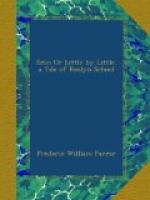But it must be admitted that he made matters worse by his own bursts of passion. His was not the temper to turn the other cheek; but, brave and spirited as he was, he felt how utterly hopeless would be any attempt on his part to repel force by force. He would have tried some slight conciliation, but it was really impossible with such a boy as his enemy. Barker never gave him even so much as an indifferent look, much less a civil word. Eric loathed him, and the only good and happy part of the matter to his own mind was, that conscientiously his only desire was to get rid of him and be left alone, while he never cherished a particle of revenge.
While every day Eric was getting on better in form, and winning himself a very good position with the other boys, who liked his frankness, his mirth, his spirit, and cleverness, he felt this feud with Barker like a dark background to all his enjoyment. He even had to manoeuvre daily how to escape him, and violent scenes were of constant occurrence between them. Eric could not, and would not, brook his bullying with silence. His resentment was loud and stinging, and, Ishmaelite as Barker was, even his phlegmatic temperament took fire when Eric shouted his fierce and uncompromising retorts in the hearing of the others.
Meanwhile Eric was on the best of terms with the rest of the form, and such of the other boys as he knew, although, at first, his position as a home-boarder prevented his knowing many. Besides Russell, there were three whom he liked best, and respected most—Duncan, Montagu, and Owen. They were very different boys, but all of them had qualities which well deserved his esteem. Duncan was the most boyish of boys, intensely full of fun, good-nature, and vigor; with fair abilities, he never got on well, because he could not be still for two minutes, and even if, in some fit of sudden ambition, he got up high in the form, he was sure to be put to the bottom again before the day was over, for trifling or talking. But out of school he was the soul of every game; whatever he took up was sure to be done pleasantly, and no party of amusement was ever planned without endeavoring to secure him as one of the number.
Montagu’s chief merit was, that he was such a thorough little gentleman; “such a jolly little fellow” every one said of him. Without being clever or athletic, he managed to do very fairly both at work and at the games, and while he was too exclusive to make many intimate friends, everybody liked walking about or talking with him. Even Barker, blackguard as he was, seemed to be a little uneasy when confronted with Montagu’s naturally noble and chivalrous bearing. In nearly all respects his influence was thoroughly good, and few boys were more generally popular.




